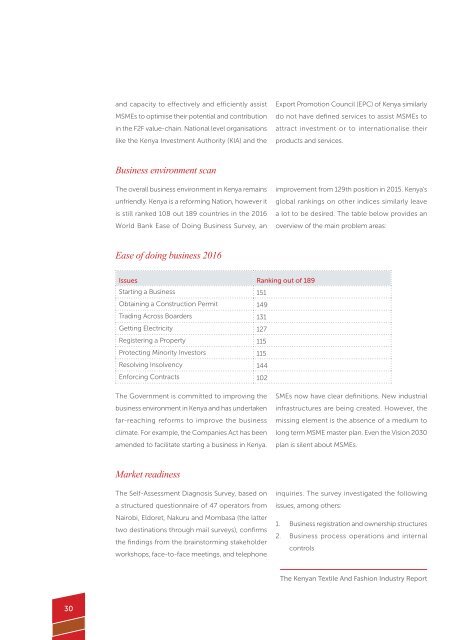You also want an ePaper? Increase the reach of your titles
YUMPU automatically turns print PDFs into web optimized ePapers that Google loves.
and capacity to effectively and efficiently assist<br />
MSMEs to optimise their potential and contribution<br />
in the F2F value-chain. National level organisations<br />
like the Kenya Investment Authority (KIA) and the<br />
Export Promotion Council (EPC) of Kenya similarly<br />
do not have defined services to assist MSMEs to<br />
attract investment or to internationalise their<br />
products and services.<br />
Business environment scan<br />
The overall business environment in Kenya remains<br />
unfriendly. Kenya is a reforming Nation, however it<br />
is still ranked 108 out 189 countries in the 2016<br />
World Bank Ease of Doing Business Survey, an<br />
improvement from 129th position in 2015. Kenya’s<br />
global rankings on other indices similarly leave<br />
a lot to be desired. The table below provides an<br />
overview of the main problem areas:<br />
Ease of doing business 2016<br />
Issues Ranking out of 189<br />
Starting a Business 151<br />
Obtaining a Construction Permit 149<br />
Trading Across Boarders 131<br />
Getting Electricity 127<br />
Registering a Property 115<br />
Protecting Minority Investors 115<br />
Resolving Insolvency 144<br />
Enforcing Contracts 102<br />
The Government is committed to improving the<br />
business environment in Kenya and has undertaken<br />
far-reaching reforms to improve the business<br />
climate. For example, the Companies Act has been<br />
amended to facilitate starting a business in Kenya.<br />
SMEs now have clear definitions. New industrial<br />
infrastructures are being created. However, the<br />
missing element is the absence of a medium to<br />
long term MSME master plan. Even the Vision 2030<br />
plan is silent about MSMEs.<br />
Market readiness<br />
The Self-Assessment Diagnosis Survey, based on<br />
a structured questionnaire of 47 operators from<br />
Nairobi, Eldoret, Nakuru and Mombasa (the latter<br />
two destinations through mail surveys), confirms<br />
the findings from the brainstorming stakeholder<br />
workshops, face-to-face meetings, and telephone<br />
inquiries. The survey investigated the following<br />
issues, among others:<br />
1. Business registration and ownership structures<br />
2. Business process operations and internal<br />
controls<br />
The Kenyan Textile And Fashion Industry Report<br />
30


